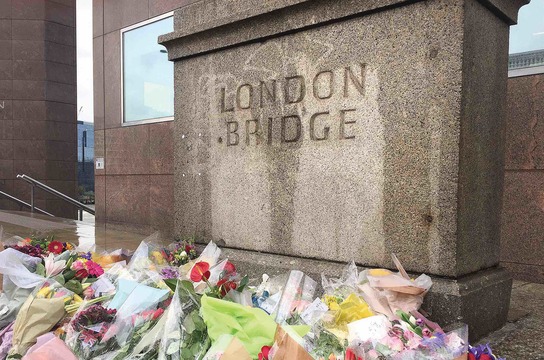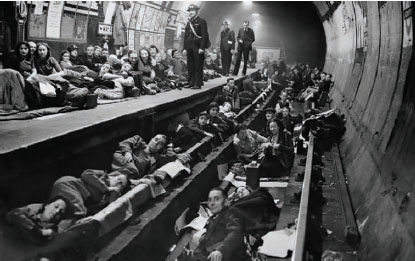
Strange times we live in. The world does indeed seem to be reeling. Barely a month goes by without a fatal terrorist incident in Britain, and political chaos has ensued from the general election that saw Theresa May’s bargaining position weaken in Brexit negotiations as well as in her grip on leadership within the Tory Party.
Just as with the political changes and rhetorical fervor in our own country, it is easy to overestimate the impact of what makes media headlines in the lives of ordinary citizens. The British people are acclaimed for their famous stoic resolve in the face of the severest of trials. It’s the British bulldog spirit personified by Winston Churchill throughout World War II. It is an attitude embraced with pride in the much-repeated wartime slogan “Keep calm and carry on.”
Social historians might trace this national characteristic through 2,000 years of wars and rumors of war, invasions and rumors of invasion, plague and cholera epidemics, the grit of life lived in mills and mines or on the sea. More recently, England lived through years of terrorism imported by the IRA in the Northern Irish “Troubles.” That’s a lot of social conditioning.

DANA HUNTLEY
“ ‘This . . . is London.’ With those words, CBS newsman Edward R. Murrow brought the horrors faced by the capital and the spirit of Londoners in the darkest days of the Blitz to American audiences. If he was broadcasting now, he would add ‘This . . . is Manchester.’ He would have the same story of phlegmatic resistance to outside forces attempting to beat us down.
“The venerable New York Times was mocked over here when it opined after the Borough Market outrage that Britain was ‘reeling.’ Twitter users quickly hit back: ‘We’ll start panicking when we’ve no milk for our tea.’ The perfect response—laughing in the face of danger and showing a refusal to be cowed. The hearts of London and Manchester may have missed a beat when deranged individuals took out their anger against the world on innocent guests and music fans in the UK, but they did not stop beating.
“Our natural temptation is to invite all British Heritage Travel readers to flock to London this autumn to stick it to the terrorists. However, it is disingenuous to throw out an invitation to foreign visitors—after all, most of the London victims were foreign—without accepting there will be wariness when people are booking their holiday travels. In the back of the mind, voices will quietly ask: Is it really safe there?
“The answer is that simply no one of my acquaintance, even those who travel to London Bridge or cross Westminster Bridge, have said they are leaving the city. Terrorism will drive no one from this city. It is even getting safer to cross the roads—overall, the number of people killed or seriously injured on London’s roads fell to 2,092 in 2016, with London on course to have reduced such incidents by 50 percent by 2020.
[caption id="" align="alignleft" width="200"]

YOUSUF KARSH LIBRARY AND ARCHIVES OF CANADA
As Churchill famously put it: ‘Keep buggering on’ (KBO). This colorful turn of phrase, which was simply slang to him, somehow sums up the British spirit as a way of dealing with the aftermath of these outrages.”
Certainly England’s largest cities bear the greatest population concentration likely to become prey to Islamist radicalization and the terrorist incidents that can be its horrific end product. In market towns and provincial cities, smaller resident Muslim populations form an unobtrusive piece of the social tapestry and play a constructive part in community life. Across most of the island, life goes on in unimpeded, familiar rhythms for resident and visitor.
So, is London safe for travel? Not compared to sitting home in your living room and watching videos about it. Compared to travel in Bogota, Baghdad, Pyongyang or even Athens, you don’t even have to ask. The likelihood of being caught in random violence in the central areas of major cities such as Manchester, Birmingham, Leeds or London, though, itself is minuscule.

WIKIPEDIA
Of course, a watchful awareness of your surroundings, a “situational awareness,” should be a natural and conscious state in international travel. It would be facile and wrong to claim that there is no risk. Travel anywhere, anytime, like most activities, always involves a measure of risk, however statistically small that might be. Consciously or unconsciously, as with every activity in life, we weigh the risk and reward.
It is preaching to the proverbial choir to remind BHT readers that the rewards of travel in Britain are great indeed. We recall the palpable history at every turn, the literary landscapes, the gardens and cathedrals, the social rituals and communal traditions of a village or a country. Most of all, we remember the people we have met along the way in casual daily discourse or in shared conversation in a local pub or over breakfast at a B&B.

WIKIPEDIA
For many years, I had a dear friendship with an older English couple who lived through the war. Arthur was a quartermaster sergeant on the first wave of the D-Day landings at Sword Beach. Lilian was a London milliner who slept on London Underground platforms through the nights of London bombings and emerged to go to work in the morning. When they sang “There’ll Be Bluebirds Over the White Cliffs of Dover” and “Rule Britannia,” they meant it.
Today, were they still with us, Arthur and Lilian would be following every Royal occasion with pride, cheering every step of Brexit, singing “There’ll always be an England,” and, of course, keeping calm and carrying on. They would be delighted to echo James’s invitation to Americans to visit Britain and “stick it to the terrorists.”





Comments